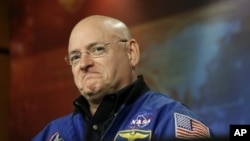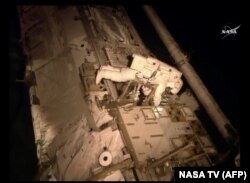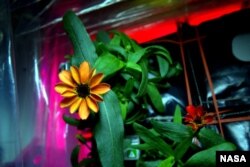The first International Space Station crew to spend almost a year in space is about to return to Earth.
As U.S. astronaut Scott Kelly levitated gently in the middle of a room with walls covered in equipment, cables, scientific instruments and several high-end cameras, he talked about his life on board the International Space Station and the prospects of much longer space missions.
"I'd like for the legacy of this flight to be that we can decide to do hard things, and hard things that will take us farther away from the Earth, and this is one of them,” he said. “And I'm hopeful, and I think we will learn a lot about longer-duration space flight and how will it take us to Mars someday."
The most difficult aspects of living in space, Kelly said, are the lack of gravity and the lack of running water. Not surprisingly, the first thing he wants to do when he gets home is to jump in his pool.
The astronaut said he feels very good physically, but admitted that it might be a subjective impression.
Asked about the psychological difficulties, Kelly said the only thing he really misses is physical contact with his family.
"I don't know if I'd necessarily call it the psychological aspect, but there's certainly, you know, a loss of connection with the folks on the ground that you care for and love and you want to spend time with. That, I think, is a challenge," he said.
Data collection
The purpose of the yearlong experiment is to collect data to help astronauts prepare for deep space missions, such as a visit to Mars.
When Kelly returns to Earth, scientists will compare his physical data to that of his twin brother, now-retired NASA astronaut Mark Kelly.
What has Scott Kelly learned from his time in space?
For future long-term missions, he said, the living quarters would have to be much better designed.
"On a trip to Mars, we're not going to have this much space, obviously,” he said. “You're going to be in much tighter quarters. You're going to live, you're going to use the restroom, you're going to exercise, all within, you know, a few square meters of one another. It's not going to be like science fiction spaceship going to Mars."
But a trip to Mars is possible in the near future, Kelly said.
"After being here for so long, that's one thing I definitely realize that, you know, if we can dream it, you know, we can do it if we really want to," he said.
Kelly and his Russian counterpart, Mikhail Kornienko, are scheduled to land at Baikonur cosmodrome in Kazakhstan on Tuesday, March 1.






